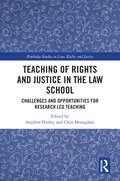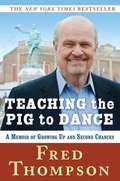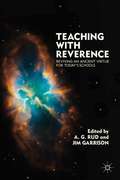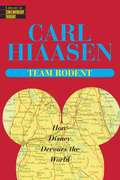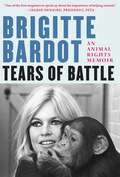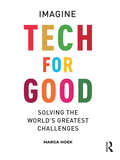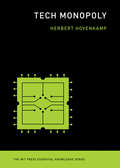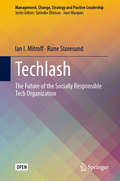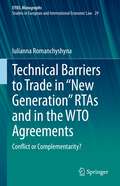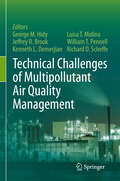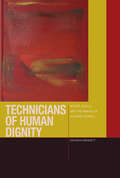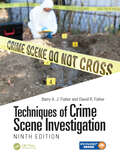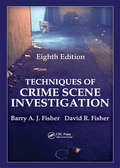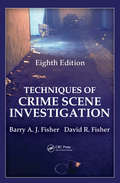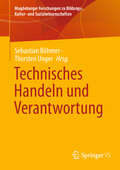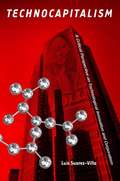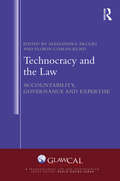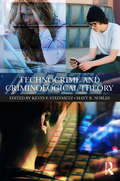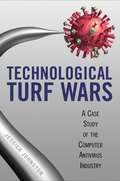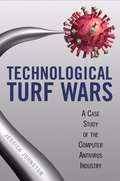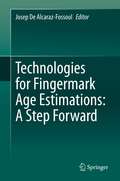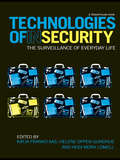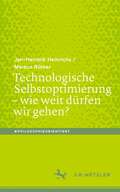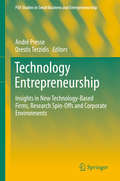- Table View
- List View
Teaching of Rights and Justice in the Law School: Challenges and Opportunities for Research Led Teaching (Routledge Studies in Law, Rights and Justice)
by Stephen Hurley and Chris MonaghanThis book examines the challenges of bringing cutting-edge research in often controversial areas into the law syllabus and explores how academics can effectively adopt a holistic approach to research and pedagogy when teaching rights and justice. The collection brings together experts from all areas of legal scholarship to discuss how they fuse often controversial aspects of rights and justice into their teaching in a way that responds to and is ultimately led by academic research. As such, it advances legal education through the opportunity to explore the interplay between rights and justice and how scholars both ensure that their teaching is research-led, whilst responding to the needs and views of students and issues such as generational differences in viewpoints on controversial issues. This topical volume will appeal to academics and researchers interested in academic freedom, the challenges of research-led teaching and the pedagogy around the teaching of rights and justice.
Teaching the Pig to Dance: A Memoir of Growing Up and Second Chances
by Fred ThompsonFred Thompson has enjoyed a remarkable career in Hollywood and politics, but when he sat down to write a memoir about how he got to be the person he is, he discovered that his best stories all seemed to come out of the years he spent growing up in and around his hometown of Lawrenceburg, Tennessee. It was a small town but not the smallest--after all, it was the county seat and it did have a courthouse, a couple of movie theaters, and its own Davy Crockett statue. For truly small, you had to travel to nearby Summertown, where the regular Sunday dinner was possum and chocolate gravy. But Lawrenceburg is where Fred got to be a kid, found his share of trouble and scrapes, came to know folks he didn't realize were so colorful at the time but sure does now, got married, had a few kids, became a man, and started his career as a country lawyer (pretty much in that order). And as Fred tells it, getting that law degree was something of a surprise for him, since in school he'd been less than stellar as a scholar. "Teaching Latin to someone like me," he says, "was like trying to teach a pig to dance. It's a waste of the teacher's time and it irritates the pig." In these reflections, as hilarious as they are honest and warm, Fred touches on the influences--family, hometown neighbors and teachers, team sports, jobs, romances, and personal crises--that molded his character, his politics, and the way he looks at life today. We get to know the unforgettable characters who congregated at the Blue Ribbon Cafe, like the rotund gentleman called "Shorty," whose claim to fame was his ability to quickly suck in his stomach and cause his pants to fall to the floor. Or Fred's Grandma Thompson, who became an early TV adopter for the sole purpose of watching Wrestling from Hollywood and who once had a "gourder" removed from her neck and subsequently walked around town with it in a handkerchief showing it to folks. One day Fred and an accomplice placed small explosive Fourth of July "cracker balls" under the four legs of their teacher's chair; Mrs. Garner sat down and, despite the racket, didn't flinch so much as a muscle--but Fred felt a twinge of the one emotion he hated most: shame. Fred idolized Coach Staggs from his high school football days, even though he was "like Captain Ahab without the humor" and didn't like smart alecks, comics, or individualists, which put the young Fred at a disadvantage. More than anyone else from those days though, Fred remembers his mom and dad, who taught him that kids are shaped most of all by the love and support they can take for granted. Teaching the Pig to Dance will delight everyone who admires Fred Thompson for his contributions to politics or for his work in movies and on TV, along with all those who just love to hear rollicking but unforgettable stories about growing up in a place where, as one of the local old-timers put it, "We weren't big enough to have a town drunk, so a few of us had to take turns."
Teaching with Reverence
by Jim Garrison A. G. RudReverence is a forgotten virtue in teaching and learning. When taken in a broader spiritual sense, it is often associated with a mute and prim solemnity. The essays gathered here examine reverence as a way to understand some of the spiritual dimensions of classroom teaching.
Team Rodent: How Disney Devours the World
by Carl Hiaasen"Disney is so good at being good that it manifests an evil; so uniformly efficient and courteous, so dependably clean and conscientious, so unfailingly entertaining that it's unreal, and therefore is an agent of pure wickedness. . . . Disney isn't in the business of exploiting Nature so much as striving to improve upon it, constantly fine-tuning God's work."--from TEAM RODENTTEAM RODENTHow Disney Devours America"Revulsion is good. Revulsion is healthy. Each of us has limits, unarticulated boundaries of taste and tolerance, and sometimes we forget where they are. Peep Land is here to remind us; a fixed compass point by which we can govern our private behavior. Because being grossed out is essential to the human experience; without a perceived depravity, we'd have nothing against which to gauge the advance or decline of culture; our art, our music, our cinema, our books. Without sleaze, the yardstick shrinks at both ends. Team Rodent doesn't believe in sleaze, however, nor in old-fashioned revulsion. Square in the middle is where it wants us all to be, dependable consumers with predictable attitudes. The message, never stated but avuncularly implied, is that America's values ought to reflect those of the Walt Disney Company, and not the other way around."From the Trade Paperback edition.
Tears of Battle: An Animal Rights Memoir
by Brigitte Bardot Anne- Cécile HuprelleAn Account of one Woman's Courage, Caring, and Generosity in the Face of the Inhumane Brigitte Bardot—a global icon of French cinema—has used her fame to give a voice to those who cannot speak for themselves. Leaving the spotlight of stardom, she has dedicated her time and fortune to promoting the welfare of animals, both domestic and wild, around the world. Over the past forty years, Bardot has evolved from an international film icon of the glamorous sixties to an icon of that of a crusader for animal rights, forming her own foundation and meeting with leaders from around the world and lobbying for legislation to protect animals. In this poignant memoir, she uncovers the struggles of her decades-long battle—detailing the too few victories and the heartbreaking defeats—and revealing herself as never before seen through her reflections about nature, herself as a superstar, and the passion that has driven her away from glamour of her previous fame toward the humble calling of serving others.
Tech For Good: Imagine Solving the World’s Greatest Challenges
by Marga HoekTech For Good reveals how Fourth Industrial Revolution technologies will help solve the world’s greatest challenges like climate change, biodiversity loss, inequality, and poverty. Tech For Good presents a unique perspective on how business can successfully apply advanced technologies in a purpose-driven manner while unlocking new markets and seizing business opportunities. Packed with 75 real-life business cases of companies from all over the world, this inspiring book unfolds a compelling narrative about how businesses commercially synergize technology and sustainability. The purpose of this book is to imagine the unprecedented possibilities advanced technologies offer business to drive sustainable growth. Tech for Good will be vital for realizing our Global Goals.
Tech Monopoly (The MIT Press Essential Knowledge series)
by Herbert HovenkampA serious look at competition problems in tech markets and whether antitrust law can help address them.In recent years, the astronomical rise of tech giants like Amazon, Apple, Meta, and Microsoft has been criticized as anticompetitive, and many have wondered if antitrust law can help protect workers and consumers. In Tech Monopoly, Herbert Hovenkamp explores competition problems in a wide range of high-tech firms—from those that sell purely digital products, such as video streaming, search, software, or email services, to others that sell more traditional “tactile” products, such as hardware, clothing, groceries, or rides. He offers a realistic look at the powers and limitations of antitrust law in tech markets with an assessment that is as comprehensive as it is accessible.After a general introduction to antitrust law, Tech Monopoly considers how competitive harm should be assessed in these markets, as well as some features that make these markets unique, including “two-sided” structures. Then Hovenkamp looks at the role of large digital platforms, including Amazon, Alphabet, Apple, Meta, and Microsoft, and considers whether their size alone is an antitrust problem or if the concern should be limited to market power. Finally, the author addresses the very difficult problem of remedies. Should we “break up” big tech, and if so, how? What kind of breakup of these firms would make users or others better off? And if breakups are not the only possible antitrust fix, are there more effective and less disruptive alternatives?Offering simple explanations of the complex economics of digital platform markets, Tech Monopoly is an important read for anyone who wishes to understand how antitrust law works and whether it can help defend competition in the formidable era of big tech.
Techlash: The Future of the Socially Responsible Tech Organization (Management, Change, Strategy and Positive Leadership)
by Ian I. Mitroff Rune StoresundTechnology has made human lives incomparably better. Civilization as we know it would utterly collapse without it. However, if not properly managed, technology can and will be systematically abused and misuse and thereby become one of the biggest threats to humankind. This open access book applies proactive crisis management to the management of technology organizations to make them more sustainable and socially responsible for the betterment of humankind. It forecasts the unintended consequences of technology and offers methods to counteract it.
Technical Barriers to Trade in “New Generation” RTAs and in the WTO Agreements: Conflict or Complementarity? (European Yearbook of International Economic Law #29)
by Iulianna RomanchyshynaThis book examines the interplay between cooperation on technical barriers to trade (TBT) in free trade agreements and the multilateral framework of the World Trade Organization. In recent years, TBT, especially differences in standards, have attracted increased interest and have been addressed as part of the WTO+ negotiated agenda in trade agreements. Because of a number of political and legal constraints, the process of further cooperation at the WTO have been stalled, which made free trade agreements a central pillar in setting the agenda of international trade governance. This leads us to rethinking the interrelation between the WTO and free trade agreements and to questioning the role of both fora in the future of trade. The book examines some TBT provisions in free trade agreements and highlights their positive and problematic aspects when it comes to the WTO-consistency and the ideas of open and inclusive trade. It also suggests that a more optimal way forward would be to increase parallel work on TBT cooperation at the WTO, a more inclusive forum that could address issues of global significance, such as environmental protection and regulation of digital goods. The book explores the potential for trade agreements to advance the WTO agenda, but notes that the organization would need to adapt its institutional structure and governance in order to do so.Drawing on the example of the EU and US so-called “new generation” trade agreements, the book provides a detailed analysis of the various methods used to navigate TBT cooperation, and offers insight into how these agreements can serve as inspiration for future multilateral disciplines. This book is a valuable resource for trade law academics, policymakers, and anyone interested in the intersection of technical barriers to trade, regional trade agreements, and the WTO.
Technical Challenges of Multipollutant Air Quality Management
by Luisa T. Molina Jeffrey R. Brook Kenneth L. Demerjian Richard D. Scheffe George M. Hidy William T. PennellRecent critiques of air quality management approaches currently employed in developed and many developing countries have suggested that efficiencies could be achieved if air quality management practices shifted from pollutant-by-pollutant approaches to a comprehensive multipollutant approach in which emission reduction decisions are based on relative risk and evaluated on their effectiveness in meeting environmental and health goals. This book assesses our technical readiness to undertake such an approach, and it outlines the technical developments that will be needed to achieve a risk-based approach air quality management that includes means for measuring the effectiveness of management decisions.
Technicians of Human Dignity: Bodies, Souls, and the Making of Intrinsic Worth (Just Ideas)
by Gaymon BennettTechnicians of Human Dignity traces the extraordinary rise of human dignity as a defining concern of religious, political, and bioethical institutions over the last half century and offers original insight into how human dignity has become threatened by its own success. The global expansion of dignitarian politics has left dignity without a stable set of meanings or referents, unsettling contemporary economies of life and power.Engaging anthropology, theology, and bioethics, Bennett grapples with contemporary efforts to mobilize human dignity as a counter-response to the biopolitics of the human body, and the breakdowns this has generated. To do this, he investigates how actors in pivotal institutions —the Vatican, the United Nations, U.S. Federal Bioethics—reconceived human dignity as the bearer of intrinsic worth, only to become frustrated by the Sisyphean struggle of turning its conceptions into practice.
Techniques of Crime Scene Investigation
by David R. Fisher Barry A. Fisher"Techniques of Crime Scene Investigation is a staple for any forensic science library and is routinely referenced by professional organizations as a study guide for certifications. It is professionally written and provides updated theoretical and practical applications using real casework. This text is a must-have for any CSI Unit or course teaching Crime Scene Investigation." – Kevin Parmelee, PhD, Detective (ret.), Somerset County, NJ Prosecutor’s Office Since the first English-language edition of Techniques of Crime Scene Investigation was published in 1964, the book has continued to be a seminal work in the field of forensic science, serving as a foundational textbook and reference title for professionals. This Ninth Edition includes several new chapters and has been fully updated and organized to present the effective use of science and technology in support of justice. New coverage to this edition addresses the debunking of a few forensic science disciplines, long thought to have been based on sound science. The book provides students, crime scene investigators, forensic scientists, and attorneys the proper ways to examine crime scenes and collect a wide variety of physical evidence that may be encountered. While it is not possible to cover every imaginable situation, this book is a comprehensive guide that details and promotes best practices and recommendations. In today’s challenging environment, it is essential that law enforcement personnel thoroughly understand and meticulously comply with the forensic evidence procedures that apply to their function in the investigation process. Criminal investigations remain as complex as ever and require professionals from many disciplines to work cooperatively toward the fair and impartial delivery of justice. Practitioners and students alike need to be aware of the increased scrutiny that they will face in the judicial system. Judges are taking a more involved role than ever before as far as the evidence and testimony that they allow into their courtrooms. No longer will substandard forensic science or crime scene investigation be acceptable. Key features: Newly reorganized contents—including 4 brand new chapters—reflects a more logical flow of crime scene processes and procedures Provides an overview of the crime scene investigation process and procedures, from the first officer on the scene through the adjudication of the case Includes several new cases, photos, and updates in technological advances in both digital evidence and DNA in particular Science and technology applied to CSI solves crimes and saves lives. Investigators, prosecutors, and defense attorneys must be able to use forensic tools and resources to their fullest potential and Techniques of Crime Scene Investigation serves as an invaluable resource to further this cause.
Techniques of Crime Scene Investigation (Eighth Edition)
by Barry A. J. Fisher David R. FisherThe application of science and technology plays a critical role in the investigation and adjudication of crimes in our criminal justice system. But before science can be brought to bear on evidence, it must be recognized and collected in an appropriate manner at crime scenes. Written by authors with over 50 years of combined experience in forensic science, Techniques of Crime Scene Investigation examines the concepts, field-tested techniques, and procedures of crime scene investigation. Detectives, crime scene technicians, and forensic scientists can rely on this updated version of the "forensics bible" to effectively apply science and technology to the tasks of solving crimes. <p><p> What’s New in the Eighth Edition: <p> The latest in forensic DNA testing and collection, including low copy number DNA<br> A new chapter on digital evidence<br> New case studies with color photographs<br> End-of-chapter study questions<br> Practical tips and tricks of the trade in crime scene processing
Techniques of Crime Scene Investigation (Forensic and Police Science)
by Barry A. J. Fisher David R. FisherThe application of science and technology plays a critical role in the investigation and adjudication of crimes in our criminal justice system. But before science can be brought to bear on evidence, it must be recognized and collected in an appropriate manner at crime scenes. Written by authors with over 50 years of combined experience in forensic science, Techniques of Crime Scene Investigation examines the concepts, field-tested techniques, and procedures of crime scene investigation. Detectives, crime scene technicians, and forensic scientists can rely on this updated version of the "forensics bible" to effectively apply science and technology to the tasks of solving crimes.
Technisches Handeln und Verantwortung (Magdeburger Forschungen zu Bildungs-, Kultur- und Sozialwissenschaften)
by Thorsten Unger Sebastian BöhmerWir sind daran gewöhnt, dass technische Bauten, Apparate und Anlagen funktionieren. Erst wenn Probleme auftreten, erfahren sie Aufmerksamkeit – und es wird die Frage nach der Verantwortung gestellt, oft an die beteiligten Ingenieure. Besonders intensiv wird diese Frage bei heiklen Hochtechnologien wie Atom- und Gentechnik oder sensiblen Infrastrukturen wie Brücken-, Kanal- und Tunnelbauten diskutiert. Im Katastrophenfall vermischen sich dann häufig juristische, sozio- und psychologische, wirtschaftliche, ethische, religiöse und ingenieurwissenschaftliche Aspekte, was sich auch für die Darstellung dieser Problematik in der Kultur seit dem Ausgang des 19. Jahrhunderts beobachten lässt. Der Band versammelt Beiträge von Expertinnen und Experten aus den Fachgebieten Maschinenbau, Technikphilosophie, Technikgeschichte, Moraltheologie, Berufs- und Betriebspädagogik, Literaturwissenschaft und Linguistik. Sie stellen theoretische wie praktische Aspekte von Verantwortung in der Ingenieurstätigkeit sowie entsprechende Diskurse in Politik, Kultur und Gesellschaft vor. Die Beiträge gehen zurück auf eine Ringvorlesung für Studierende aller Fakultäten im Sommersemester 2023 an der Otto-von-Guericke-Universität Magdeburg.
Technocapitalism: A Critical Perspective on Technological Innovation and Corporatism
by Luis Suarez-VillaA new version of capitalism, grounded in technology and science, is spawning new forms of corporate power and organization that will have major implications for the twenty-first century. Technological creativity is thereby turned into a commodity in new corporate regimes that are primarily oriented toward research and intellectual appropriation. This phenomenon is likely to have major social, economic and political consequences, as the new corporatism becomes ever more intrusive and rapacious through its control over technology and innovation. In his provocative bookTechnocapitalism, Luis Suarez-Villa addresses this phenomenon from the perspective of radical political economy and social criticism. Grounded in the premise that relations of power influence how human creativity and technology are exploited by the new corporatism, the author argues that new forms of democratic participation and resistance are needed, if the social pathologies created by this new version of capitalism are to be checked. Considering the new sectors affected by technocapitalism, such as biotechnology, nanotechnology, bioinformatics, and genomics, Suarez-Villa deciphers the common threads of power and organization that drive their corporatization. These new sectors, and the corporate apparatus set up to extract profit and power through them, are imposing standards, creating business models, molding social governance, and influencing social relations at all levels. The new reality they create is likely to affect most every aspect of human existence, including work, health, life, and nature itself.
Technocracy and the Law: Accountability, Governance and Expertise (Transnational Law and Governance)
by Florin Coman-Kund Alessandra ArcuriTechnocratic law and governance is under fire. Not only populist movements have challenged experts. NGOs, public intellectuals and some academics have also criticized the too close relation between experts and power. While the amount of power gained by experts may be contested, it is unlikely and arguably undesirable that experts will cease to play an influential role in contemporary regulatory regimes. This book focuses on whether and how experts involved in policymaking can and should be held accountable. The book, divided into four parts, combines theoretical analysis with a wide variety of case studies expounding the challenges of holding experts accountable in a multilevel setting. Part I offers new perspectives on accountability of experts, including a critical comparison between accountability and a virtue-ethical framework for experts, a reconceptualization of accountability through the rule of law prism and a discussion of different ways to operationalize expert accountability. Parts I–IV, organized around in-depth case studies, shed light on the accountability of experts in three high-profile areas for technocratic governance in a European and global context: economic and financial governance, environmental/health and safety governance, and the governance of digitization and data protection. By offering fresh insights into the manifold aspects of technocratic decisionmaking and suggesting new avenues for rethinking expert accountability within multilevel governance, this book will be of great value not only to students and scholars in international and EU law, political science, public administration, science and technology studies but also to professionals working within EU institutions and international organizations.
Technocrime and Criminological Theory
by Kevin F. Steinmetz Matt R. NoblesCybercrime, computer crime, Internet crime, and technosecurity have been of increasing concern to citizens, corporations, and governments since their emergence in the 1980s. Addressing both the conventional and radical theories underlying this emerging criminological trend, including feminist theory, social learning theory, and postmodernism, this text paves the way for those who seek to tackle the most pertinent areas in technocrime. Technocrime and Criminological Theory challenges readers to confront the conflicts, gaps, and questions faced by both scholars and practitioners in the field. This book serves as an ideal primer for scholars beginning to study technocrime or as a companion for graduate level courses in technocrime or deviance studies.
Technological Turf Wars: A Case Study of the Computer Antivirus Industry
by Jessica JohnstonInTechnological Turf Wars, Jessica Johnston analyzes the tensions and political dilemmas that coexist in the interrelationship among science, technology and society. Illustrating how computer security is as concerned with social relationships as it is with technology, Johnston provides an illuminating ethnography that considers corporate culture and the workplace environment of the antivirus industry. Using a qualitative, interdisciplinary approach, which combines organizational and security studies with critical and social analysis of science and technology, Johnston questions the motivations, contradictions and negotiations of antivirus professionals. She examines the tensions between the service ethics and profit motives-does the industry release viruses to generate demand for antivirus software?-and considers the dynamics within companies by looking at facets such as gender bias and power politics. Technological Turf Warsis an informed, enlightened and entertaining view of how the production of computer security technology is fraught with social issues.
Technological Turf Wars: A Case Study of the Computer Antivirus Industry
by Jessica R. JohnstonIllustrating how computer security is as concerned with social relationships as it is with technology, Johnston provides an illuminating ethnography that considers corporate culture and the workplace environment of the antivirus industry. Using a qualitative, interdisciplinary approach, which combines organizational and security studies with critical and social analysis of science and technology, Johnston questions the motivations, contradictions and negotiations of antivirus professionals. She examines the tensions between the service ethics and profit motives--does the industry release viruses to generate demand for antivirus software?--and considers the dynamics within companies by looking at facets such as gender bias and power politics. Technological Turf Wars is an informed, enlightened and entertaining view of how the production of computer security technology is fraught with social issues.
Technologie, sozialer Wandel und menschliches Verhalten: Einfluss für Wirkung
by Cornelia C. WaltherDieses Buch befasst sich mit dem organischen Kontinuum, das Individuen, Gemeinschaften und die Gesellschaft miteinander verbindet. Ein Überblick über Aspirationelle Algorithmen (AA) und Wertvolle Werkzeuge (WW) illustriert den möglichen Nutzen von Technologie, um einen bewussten Übergang einzuleiten, vom KI-Kult zur Kultivierung von Höherer Humanität (HH). Die menschliche Einstellung, die hinter dem Design und der Nutzung von Technologie steht, bestimmt die Ergebnisse der Technologie. Wenn das angestrebte Ergebnis das Gemeinwohl ist, dann muss das vorausgehende menschliche Streben auf dieses Ziel ausgerichtet sein. Nur eine Technologie, die mit dem Ziel konzipiert wurde, eine Gesellschaft zu schaffen die den Einzelnen zur Entfaltung seines Potenzials befähigt, wirkt sich positiv auf das Gemeinwohl aus. Angesichts des ständigen Wechselspiels zwischen den vier Dimensionen der menschlichen Existenz - Seele, Herz, Verstand, Körper -, die sich in Form von Bestrebungen, Emotionen, Gedanken und Empfindungen ausdrücken, wird deutlich, wie Technologie dazu dienen kann, den Einzelnen systematisch von der Inspiration zum Wunsch, von der Information zur Zündung einer spürbaren Veränderung zu führen. Dieses Buch erklärt den Übergang entlang einer multidimensionalen Einfluss Skala. Zwei sich gegenseitig beeinflussende Dynamiken werden analysiert: erstens der Einfluss von Werten und Bestrebungen auf die Wirkung von Technologie und zweitens der Einfluss von Technologie auf die Einstellung und das Handeln der Nutzer. Beide Ansätze zielen darauf ab, zu bewerten wie Hard- und Software einem Maximum an Menschen zu einem sinnvollen, glücklichen Leben verhelfen können.
Technologies for Fingermark Age Estimations: A Step Forward
by Josep De Alcaraz-FossoulThis book discusses new applications of technologies that have been or could be successfully employed to estimate the age of fingermarks. Determining the specific time a fingermark is deposited could become a powerful new development in forensic science and a useful application to law enforcement. This book aims to shed some light on this important and still controversial area of scientific research. The expert chapters review recent discoveries and current developments with a practical bent, focusing on prospective uses in real-world crime scenes. They take a multidisciplinary approach, featuring contributors with diverse specialties including Chemistry, Imaging Technologies, Forensic Science, Biology and Microbiology. The balanced presentation incorporates critiques on fingermark aging studies, explores the reliability of fingermarks as evidence, and discusses how the estimation of “age” can improve robustness of crime evidence. Each chapter describes a unique aspect of fingermark aging observed from a different analytical perspective: 2D imaging; 3D imaging; chemical analysis; chemical imaging; microbiome analysis; electrochemical analysis; and DNA analysis, as well as the role and application of statistics. Illustrations and graphs aid the reader in understanding the concepts being explained. Not just a compilation of techniques and methods, this book’s emphasis on practical applications and its easy-to-read style will appeal to a broad audience of scientists and criminal justice professionals alike. It will be of great interest to law enforcement, academia, and the criminal justice community; including forensic scientists, investigators, lawyers, students, and researchers. It aims to help facilitate debates in the broader community about the feasibility, convenience, and relevance of estimating the age of evidence.
Technologies of InSecurity: The Surveillance of Everyday Life
by Katja Aas Helene Gundhus Heidi LomellTechnologies of Insecurity examines how general social and political concerns about terrorism, crime, migration and globalization are translated into concrete practices of securitisation of everyday life. Who are we afraid of in a globalizing world? How are issues of safety and security constructed and addressed by various local actors and embodied in a variety of surveillance systems? Examining how various forms of contemporary insecurity are translated into, and reduced to, issues of surveillance and social control, this book explores a variety of practical and cultural aspects of technological control, as well as the discourses about safety and security surrounding them. (In)security is a politically and socially constructed phenomenon, with a variety of meanings and modalities. And, exploring the inherent duality and dialectics between our striving for security and the simultaneous production of insecurity, Technologies of Insecurity considers how mundane objects and activities are becoming bearers of risks which need to be neutralised. As ordinary arenas - such as the workplace, the city centre, the football stadium, the airport, and the internet - are imbued with various notions of risk and danger and subject to changing public attitudes and sensibilities, the critical deconstruction of the nexus between everyday surveillance and (in)security pursued here provides important new insights about how broader political issues are translated into concrete and local practices of social control and exclusion.
Technologische Selbstoptimierung – wie weit dürfen wir gehen? (#philosophieorientiert)
by Jan-Hendrik Heinrichs Markus RütherTechnologische Selbstoptimierung ist gegenwärtig in aller Munde. Sie umfasst die Erforschung neuer Möglichkeiten im Hinblick auf Schönheitsoperationen, funktionale Implantologie, Gehirndoping oder die Verlängerung der Lebensspanne. Gegenüber vielen dieser technischen Mittel, die oft nicht legal verfügbar sind, bestehen erhebliche gesellschaftliche Vorbehalte. Jan-Hendrik Heinrichs und Markus Rüther plädieren bei ihrer ethischen Einschätzung für eine Differenzierung der Perspektive: Die Vorbehalte sind nämlich ihrer Meinung nach nicht geeignet, gesellschaftliche Ächtung oder gar verbindliche Verbote für alle zu begründen. Vielmehr habe die Freiheit zur Selbstgestaltung Vorrang, was jedoch nicht heißt, dass es für manche Bereiche nicht auch klare Regeln geben muss. Weil Selbstgestaltung aber nur frei sein kann, wenn sie informiert ist, argumentieren die Autoren für Regelungen, die von weitgehenden Informationspflichten statt von Verboten bestimmt sind. Aus einer individuellen Sicht heraus lassen sich zudem eine Reihe von moralischen Empfehlungen formulieren, die zwar nicht eingefordert werden können, aber einen ethischen Kompass bilden, um sich im Dickicht der ethischen Debatte an guten Gründen zu orientieren.
Technology Entrepreneurship: Insights In New Technology-based Firms, Research Spin-offs And Corporate Environments (Fgf Studies In Small Business And Entrepreneurship Ser.)
by André Presse Orestis TerzidisThis collection of expert articles explores the development drivers of new technology-based firms and projects. It provides perspectives for an in-depth understanding of how technological inventions lead to the creation of new and sustainable companies or business units. The authors address methods and concepts that help technology-based start-ups and entrepreneurial projects successfully develop innovative products and services.
